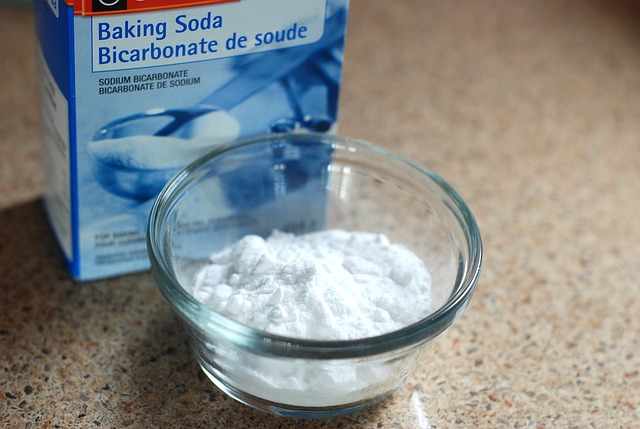Upset stomach which causes a host of symptoms and may arise due to a whole lot of possible causes are tricky things to find solutions for unless you know the cause. Assuming you’re dealing with an uncomplicated stomach ache these solutions can help bring relief from the pain and discomfort that’s making you miserable.
Baking Soda
Baking soda acts as a natural antacid and contributes to neutralize the excess stomach acids. It restores the pH balance in the body and contributes to breaking down food which makes digestion easier.
Avoid taking baking soda in large amounts because it may cause high blood pressure. If you’re on a restricted sodium diet, it is wise not to take it as baking soda may lead to other health issues.
Method
Take one teaspoon of baking soda, few crushed peppermint leaves and a teaspoon of lemon juice. Mix the above ingredients with ½ a cup of water. Drink this potion immediately with small ice cubes. If you suffer from burning sensation in your stomach, this combination soothes the upset stomach.
Slippery elm
Native Americans have been using slippery elm as an herbal remedy for centuries. Slippery elm contains mucilage: a compound that thickens and becomes slippery when mixed with water. If you take it internally, it has a soothing and anti-inflammatory effect on the digestive tract. It coats the digestive tract and protects your stomach lining from the damaging effects of excess acid.
If you’re pregnant or breastfeeding, better avoid taking slippery elm as it may increase your chances of miscarriage.
Method:
Mix 1 tsp of slippery elm with water to make a paste. Gently add half a pint of boiling water. Stir it well drink this herbal tea 2-3 cups daily.
You can mix two tsp of loose, slippery elm powder to milk or water to make a drink.
Rice tea
Research studies confirm that rice has low allergenicity. It is well absorbed in the small bowel and produces little intestinal gas. Several clinical studies have proved that you can very well tolerate rice based meals. They improve gastrointestinal symptoms in functional gastrointestinal disorders. Rice has reduced fiber content and is a superior source of carbohydrate in patients with FGID.
Method:
To soothe an upset stomach, you can make rice tea. Boil half a cup of rice in 6 cups of water for 15 minutes. Strain the rice. Spice up the rice tea with a dash of honey or sugar and drink warm.
Carrot and Mint Juice
The gastric mucosa or the stomach lining protects your stomach cavity from micro-organisms. It lubricates the foods that reach your stomach and aids in its smooth movement. Damage to the stomach lining can trigger some conditions such as ulcers, gastritis, and inflammation of the stomach lining. Carrot juice has a rich supply of vitamin A, and it prevents the above said gastrointestinal conditions
Mint
Peppermint’s numbing and calming effect blocks the increase of calcium ions that cause muscle cramping. Peppermint relaxes the involuntary muscles of your digestive tract which loosens cramps and relieves bloating and nausea. This action allows the accumulated painful gas to pass both upward and downward through the tract easing upset stomach and indigestion.
Method
Boil together four sliced carrots and 4 cups of water. Add one tsp of dried peppermint or the peppermint tea bag. Cook them over medium-low heat for about 15 minutes till the carrots are soft. Blend the juice well and enjoy.
Green tea
The Chinese and Indians drank green tea for digestive health dating thousands of years back. You can expect 50 to 150g of polyphenols in an average cup of green tea. The polyphenols in green tea quicken the digestive process helps to break down food efficiently increases metabolism and burns fat.
Green tea neutralizes gas in the digestive system and relieves pressure from bloating. The polyphenols in green tea help prevent the growth of cancer cells in the stomach.
The caffeine present in green tea may increase heart rate, irritability, and insomnia. So always drink green tea in moderation.
Method:
Heat water in a pan. Switch it off before it reaches the boiling point. Add one tsp of green tea powder to the hot water. Allow it to stand for 2-3 minutes and strain the tea. Add a pinch of cardamom, sugar or honey to enhance the taste.
Carom and Fennel Seeds
Carom seeds contain high amounts of thymol which helps in the secretion of gastric juices from the stomach and thus speeds up the process of digestion. Carom seeds pose stimulant, antispasmodic and carminative properties.
The seeds can help in all types of intestinal worms by stopping the growth of parasites. The Ayurvedic specialists say it is more efficient in hookworm infestation.
Fennel seeds have anti-spasmodic, anti-microbial and anti-inflammatory properties. It is a powerful natural carminative which means it eliminates gas from the intestinal tract and helps in digestion. It is an excellent source of antioxidants which contribute to protecting the body from free radicals and helps in better digestion. Fennel seeds ease free movement in the small intestine.
Method
Take ½ tsp carom seeds and one tsp fennel seeds and boil in one liter of water for 10 to 15 minutes, strain the water and allow it to cool. Drink the water twice a day. Nibble a handful of carom seeds after eating if you feel queasy.
You can sip fennel tea or chew some fennel seeds or crunch on them raw.
Chamomile tea
Preclinical model studies show that chamomile inhibits Helicobacter pylori the bacteria that can contribute to stomach ulcers. It helps in reducing smooth muscle spasms linked with various gastrointestinal inflammatory disorders.
Chamomile tea helps to relieve discomfort caused by lactose intolerance. It reduces bloating, relaxes your mind and neutralizes stomach acids.
Method: Add two teaspoons of dried chamomile flowers to one cup of hot water. Steep it for 5 minutes and then strain. Add honey to enhance the taste. Drink this tea 2-3 times a day.
Coconut
Coconut water can rehydrate your body very quickly. It is rich in potassium and is the best remedy to soothe an inflamed stomach. Coconut water contains lauric acid. Your body converts it into monolaurin which has antibacterial properties.
Coconut milk and water are very useful in treating peptic ulcer and gastric ulcer. Research studies show that coconut milk was more effective in reducing stomach ulcers in rats than coconut water.
Coconut contains caprylic acid, capric acid and lauric Acid which are medium chain fatty acids. Research studies point out that supplementation of diets with medium chain fatty acids delays the growth of gastric cancer cells.
Coconut water improves the total parenteral nutrition in patients with digestive tract cancer who are undergoing surgery. Research studies say that medium chain fatty emulsions can significantly enhance their nutritional status.
Method
You can enjoy a few cups of coconut milk or water daily. A kernel of tender coconut once a week can be a healthy addition to your regular diet. Otherwise, you can take one tablespoon of coconut oil in the morning for about a week. Since the oil contains medium chain fatty acids, it will get digested quickly.
Ginger
Ginger has anti-inflammatory properties. It gives relief from indigestion and hyperacidity. Ginger contains antioxidants which decrease the free radical production. The active components of ginger 6-gingerol and 6-shogaol exert anticancer activities against GI cancer. The spice is also used to treat nausea, heartburn, flatulence, and infections.
Ginger quickens gastric emptying and stimulates antral contractions. Thus it prevents constipation, bloating and stomach cramps.
Method
Chew on a fresh ginger root or sprinkle a bit on toast, baked apples or grilled unbreaded chicken breast. These ginger sprinkled foods help ease nausea and gas pains. You can add grated ginger to your tea to boost your digestive health.
Mix equal quantities of ground ginger, cardamom, and fennel to make a fine powder. Add a teaspoon of this powder to water and add a pinch of asafetida. Mix well and drink this portion once or twice a day.
Additional Tips To Prevent Upset Stomach
If you suffer from an upset stomach once in a while, you can try the various home remedies which we have discussed. But if you experience persistent symptoms you can seek help from a gastroenterologist.
You can discuss any medications that you’re taking with your doctor. Some medications may irritate your stomach lining, and a change of medicines will solve the problem.
If you’re addicted to alcohol, caffeine and carbonated beverages better avoid it or at least reduce the amount. If you smoke, quitting the habit can greatly help.
Include lots of probiotics in your diet. Fermented foods such as buttermilk, sauerkraut, yogurt, sourdough bread, kimchi, and kefir restore the bacterial balance to your digestive system, lowers the number of harmful bacteria and greatly enhances your digestive health.
Avoid foods that may upset your stomach. Common triggers include spicy or high-fat foods, alcohol, caffeine and dairy products. Eat smaller meals during the day; this gives your body time to digest the food. Chew your foods correctly: this action prevents swallowing in the air that may lead to bloating.
Maintain a healthy weight range. It will avoid putting pressure on your abdomen preventing excess acid from backing up into your esophagus. Stress can cause an upset stomach. You can practice relaxation techniques such as yoga to reduce your stress levels. Exercising and taking proper rest will help you to lead an active and healthy life.

















